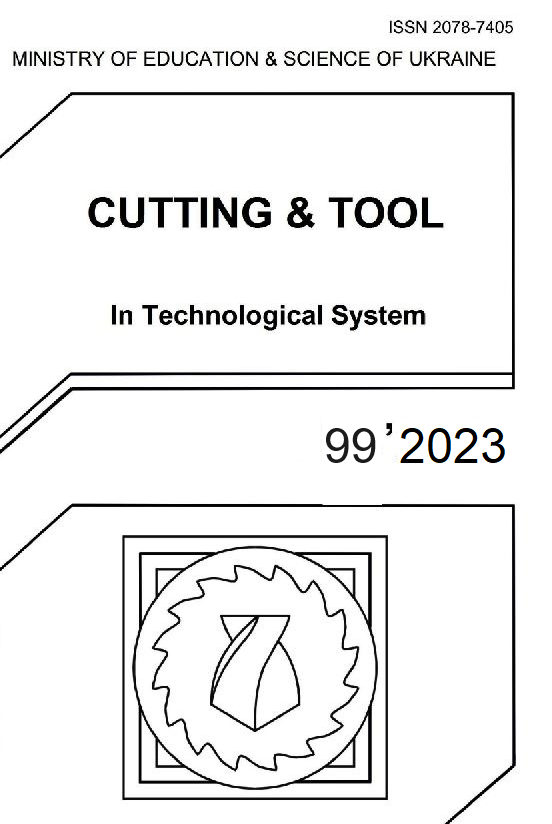STUDYING THE INFLUENCE OF THERMOMECHANICAL PHENOMENA ON GRINDED SURFACE QUALITY PARAMETERS OF PRODUCTS MADE FROM HARD-TO-PROCESS MATERIALS
DOI:
https://doi.org/10.20998/2078-7405.2023.99.13Keywords:
grinding, processed surface quality, thermomechanical phenomena, model, defects, technological parameters, defects-free processing criteriaAbstract
Grinded surface quality state of products made from hard-to-process materials is formed under the influence of thermomechanical phenomena during final machining operations. But grinding causes the formation of burns, cracks, and tensile stresses in surface layers of products. These defects significantly influence reliability and durability of products during their operation. High thermal tension of diamond-abrasive processing leads to the fact that thermophysics of these processes is dominating in formation of quality characteristics of processed surface. Existing grinding methods for products made from hard-to-process materials do not allow to fully eliminate defects that occur in surface layer. Among the factors that conduce these defects are inevitable fluctuations of processing allowance, microheterogenity of the material characterized by the size of grain, packaging defects, structural transformations and dislocations, product warping during thermal treating, insufficiently studied thermomechanical phenomena. The mentioned effects accompany grinding process and cause burn marks, microcracks, structural transformations, residual stresses. Exploration of thermomechanical phenomena that form the quality of surface layer considering preceding machining operations of products, determining their influence on cracks and burns formation based on quality analysis of thermal and stress states and make up the objective of this research. This paper proposes more efficient models for studying quantitative connections between technological system parameters, physical and mechanical properties of processed materials, their structure, and thermomechanical processes during grinding. We have developed optimal technological parameters for processing metals and alloys prone to defects in surface layer based on determined relationships. Such defects encompass defects like cracks, burns, and chips.
References
V. O. Dziura and P. O. Marushchak, Technological methods for ensuring the quality parameters of surfaces of bodies of rotation and their profilometric control, Ternopil: FOP Palyanytsya, 2021, p. 170.
D. M. Stepanov, N. V. Gonchar, E. V. Kondratyuk, P. R. Tryshyn, Features of finishing processing of complex-profile and thin-walled aviation parts with brush polymer-abrasive tools, Zaporizhzhia: NU "Zaporizhzhia Polytechnic", 2022, p. 200.
V. G. Lebedev, E. A. Lugovskaya, A. V. Ovcharenko , Experimental studies of the process of grinding martensitic-aging steel N18K9M5T, Technologies in mechanical engineering, №. 27, pp. 69–78, 2017.
F. Novikov, V. Polyansky, Determination of conditions for improving the quality of machining by temperature criterion, Perspective technologies and devices, № 17, pp. 99–105, 2020.
O. E. Semenovskiy, Improving the manufacturability of manufacturing complex-profile parts. Series Technical sciences.
Y. M. Kusyj, Naukovo-prykladni osnovy tekhnolohichnoho uspadkuvannia parametriv yakosti dlia zabezpechennia ekspluatatsiinykh kharakterystyk vyrobiv, Lviv, 2021. [in Ukrainіаn]
A. A. Levchenko, Influence of technological heredity in the production of spare parts on the water supply of parts and their wear resistance, Problems of Technology, no. 2, pp. 23–28, 2006.
O. V. Yakimov, A. V. Usov, P. T. Slobodyanyuk, D. V. Iorgachov, Thermophysics of machining, Odesa: Astroprint, 200, p. 256.
A. G. Derevyanchenko, T. V. Kozhukhar, S. K. Volkov, Complex system for recognition of classes of defects of surfaces and structures of materials, Technologies in mechanical engineering, no. 12, pp. 98–108, 2017.
A. A. Matalin, Yssledovanye temperatur shlyfovanyia stalnыkh yzdelyi. V knyhe "Kachestvo poverkhnosty y dolhovechnost detalei mashyn", Kh: Monography, 2007. [in Russian]
A. V. Yakimov, Y. A. Naparin, A. N. Parshakov, Prychyni voznyknovenyia shlyfovochnikh treshchyn., Vestnik Mashynosrojeniya, no. 8, pp. 46–49, 1974. [in Russian]
S. A. Popov, N. P. Malevskiy, L. M. Tereshenko, Almazno-obrazivnaya obrabotka metallov i tverdykh splavov, Moscow: Mashinostrojeniye, 1977, p. 263. [in Russian]
A. V. Yakimov, Modelirovanije termomekhanicheskikh protsesov pri shlifovanii neodnorodnikh materialov, in Teplofizika tekhnologicheskikh protsesov, Toljatti, 1988. [in Russian]
A. V. Usov, A. V. Yakimov, E. A. Kormiltsna, F. M. Salkovskiy, Prichyny poyavlenija defektov pri shlifovanii magnitotverdykh splavov, Tekhnologija elektrotekhnicheskogo proizvodstva, vol. 1, no. 4, p. 3, 1998. [in Russian]
A. V. Usov, A. V. Yakimov, I. P. Sazonov, Vliyanije termomekhanicheskikh napryazheniy na treshinoobrazovanije pri shlifovanii tsementiruemikh splavov, in Sovremennyje problemi rezaniya instrumentami iz sverkhtverdykh materialov, Kharkiv, 1981. [in Russian]
Y. S. Podstrygach, Y. M. Kolyako, Obobshennaya termomekhanika, Kyiv: Naukova dumka, 1976, p. 312. [in Russian]
G. Y. Popov, Selected works, Vols. 1,2, Odessa: VMV, 2007.
N. G. Stashchuk, Problems of mechanics of elastic bodies with crack-like defects, Kyiv: Naukova Dumka, 2009, p. 324.
V. V. Panasyuk, Limiting equilibrium of fragile bodies with cracks, Kyiv: Naukova Dumka, 2008, p. 248.
G. A. Oborsky, A. F. Dashchenko, A. V. Usov, D. V. Dmitrishin, Modeling of systems, Odessa: Astroprint, 2013, p. 664.
B. Boly, J. Weiner, Theory of temperature stresses, Moskow: Mir, 1964, p. 427.
Y. S. Podstrygach, Y. M. Kolyano, Neustanovivsheisya temperaturnyje polya i napryazheniya v tonkikh plastinakh, Kyiv: Naukova Dumka, 1972, p. 308. [in Russian]
V. I. Pokhmurskiy, Y. I. Kruzhanivskiy, Mekhanika ruynuvannya i mitsnist materialiv, vol. 10, Lviv - Ivano-Frankivsk, 2006, p. 1193. [in Ukrainіаn].
Downloads
Published
Issue
Section
License
Copyright Notice
Authors who publish with this Collection agree to the following terms:
1. Authors retain copyright and grant the Collection right of first publication with the work simultaneously licensed under a Creative Commons Attribution License that allows others to share the work with an acknowledgement of the work's authorship and initial publication in this Collection.
2. Authors are able to enter into separate, additional contractual arrangements for the non-exclusive distribution of the Collection's published version of the work (e.g., post it to an institutional repository or publish it in a book), with an acknowledgement of its initial publication in this Collection.
3. Authors are permitted and encouraged to post their work online (e.g., in institutional repositories or on their website) prior to and during the submission process, as it can lead to productive exchanges, as well as earlier and greater citation of published work.

